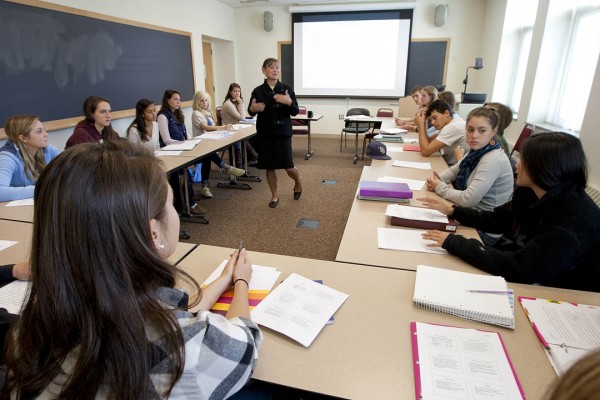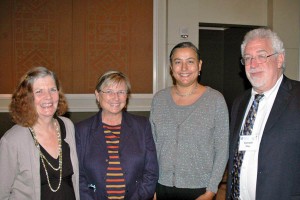Psychology department receives national award for dedication to service

Professor of Psychology Kathy Low leads a discussion in her first-year seminar “Corporal Culture: Body and Health in America.” The course addresses a variety of topics related to body and health, from body image to body dysmorphia.
Bates College is one of two higher-education institutions nationwide to be honored by the American Psychological Association for a distinctive culture of service to the field of psychology.
Kathryn Low, professor of psychology and associate dean of the faculty at Bates, accepted the APA’s Departmental Award for Culture of Service in the Psychological Sciences on behalf of the college during a Sept. 29 ceremony in Washington, D.C.
The award recognizes college or university academic psychology departments that consistently support service by faculty, encourage students to engage in service and demonstrate a commitment to service in the psychological sciences.
The Bates psychology department has “an inspiring record of service to the discipline,” the APA noted. Such service takes myriad forms, such as mentoring students and faculty colleagues, taking leadership roles in professional organizations and publications, advocating for psychology in the public arena and more.
“The department’s commitment to student research, collaborative study, career guidance and nurturing a culture of reflection on psychological science is impressive,” the APA stated. The department is an “outstanding model of scholarship, mentoring, teaching and service to its students and surrounding community.”

The co-chairs of the American Psychological Association Board of Scientific Affairs are Lynne Cooper, far left, and Kenneth Sher, far right. Next to Cooper is Kathryn Low, professor of psychology and associate dean of the faculty at Bates, who accepted the APA award for the college. Between Low and Sher is Jean Fox Tree, accepting the Culture of Service Award for the University of California at Santa Cruz.
Departmental awardees receive $5,000 to support departmental activities. Also receiving the 2012 departmental award was the psychology department at the University of California, Santa Cruz. Jacquelynne S. Eccles, professor of psychology and education at the University of Michigan, received a similar honor for individuals, the Award for Distinguished Service to Psychological Science.
“I believe the psychology department at Bates exhibits a passion and level of engagement that make it distinctive in its service to our discipline,” says department chair Todd Kahan.
Mentoring is a key aspect. “Bates is a small, highly ranked liberal arts college where students have the opportunity to work collaboratively with faculty both in and outside the classroom,” he says. “Members of my department take these mentoring relationships very seriously.”
Saul Miller, a member of the class of 2004 now teaching psychology at the University of Kentucky, credits Bates psychology professor Michael Sargent with arranging a key summer internship for him at Harvard with a prominent social psychologist, Mahzarin Banaji. “As a faculty member in social psychology myself, I now realize how hard it must have been for Michael to get me that internship, and what a great opportunity it was,” Miller says.
“Indeed, Michael went above and beyond the call of duty several times when it came to mentoring and making sure I had the best possible education.”
In the public realm, Bates psychology faculty are robust advocates for their field. For instance, professors Georgia Nigro and Rebecca Fraser-Thill are members of a Maine initiative that promotes awareness about the welfare of infants and toddlers, and they helped draft early-learning guidelines now used at childcare centers statewide. Nigro has also played a leading role in a major statewide effort to understand the causes of boys’ declining academic achievement.
Krista Aronson has developed a storybook project — a collaborative effort among local elementary schools, community agencies and Bates — aimed at enhancing intercultural relationships during the years from childhood into emerging adulthood.
Amy Douglass, a forensic psychologist nationally known for her research into the reliability of eyewitness identification, has testified as an expert witness in criminal court cases regarding the procedures used to obtain such identification. Douglass also represents another dimension of service to the field of psychology, serving this year as an associate editor for the top-ranked APA journal Law and Human Behavior.
Other psychology faculty are active in media both mainstream and specific to the field of psychology. Jason Castro, a neuroscientist who just joined the department, writes frequently about psychological research for Scientific American. Fraser-Thill has served as a contributing writer in child development for the website about.com, a New York Times Company.
Faculty service to the community is integral to the department’s activities. Low, for example, was an organizer of a regional professional conference, held at the college in 2010, dedicated to issues in African refugee health.
That commitment to community is reflected in student service-learning projects, both individual and course-related, through which dozens of psychology students benefit community initiatives — often involving children — and enhance their own learning every year.
A senior from Bala Cynwyd, Pa., Alyson Goldstein is a psychology major who says that the department’s commitment to service is infectious. She took a community-based research methods course through which her class helped develop a support program for teen parents in Auburn.
“People in the class got kind of passionate about it,” she says. “It wasn’t just a school project — it turned into, ‘This is cool! We are making a difference!’ ”


